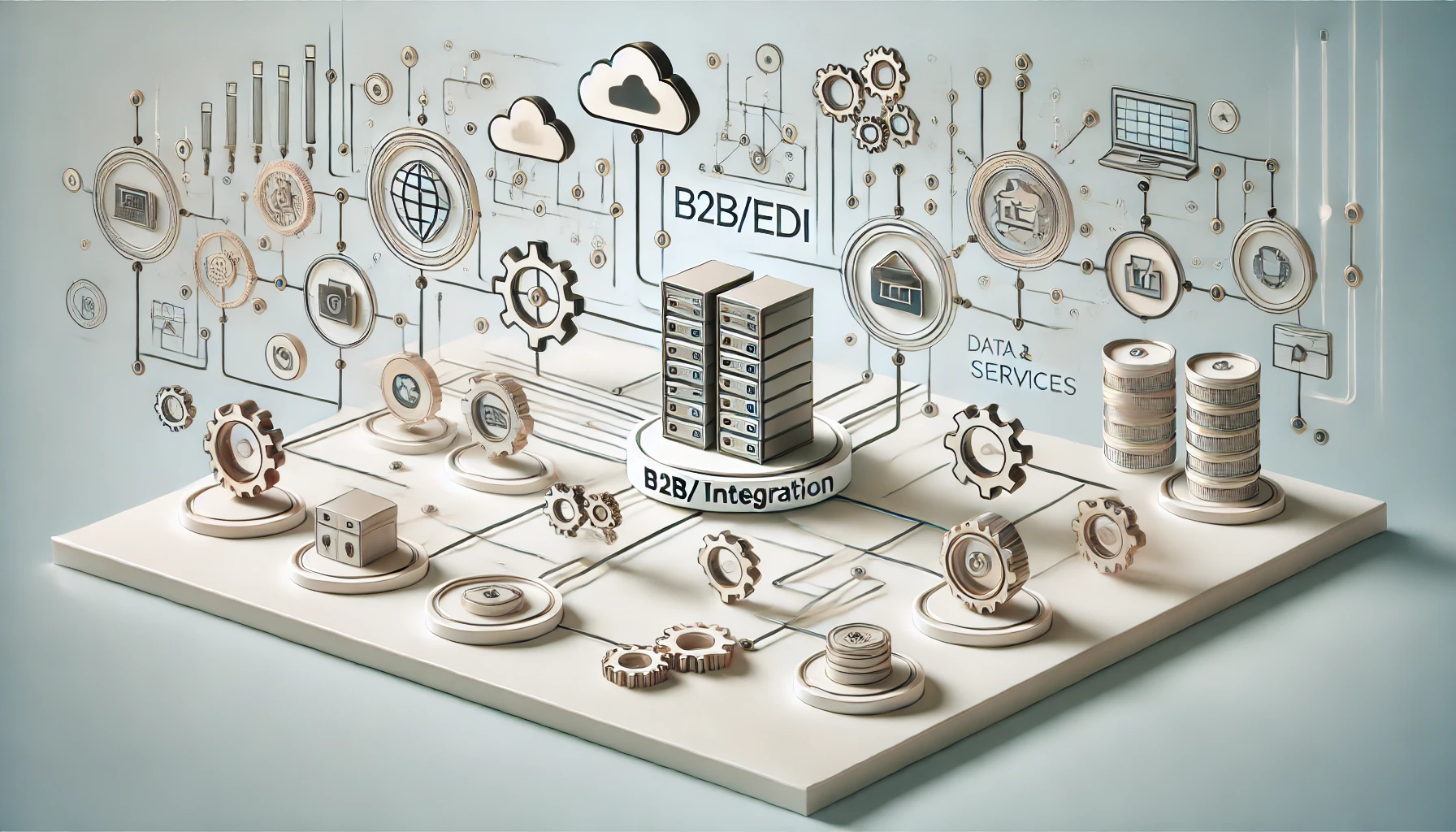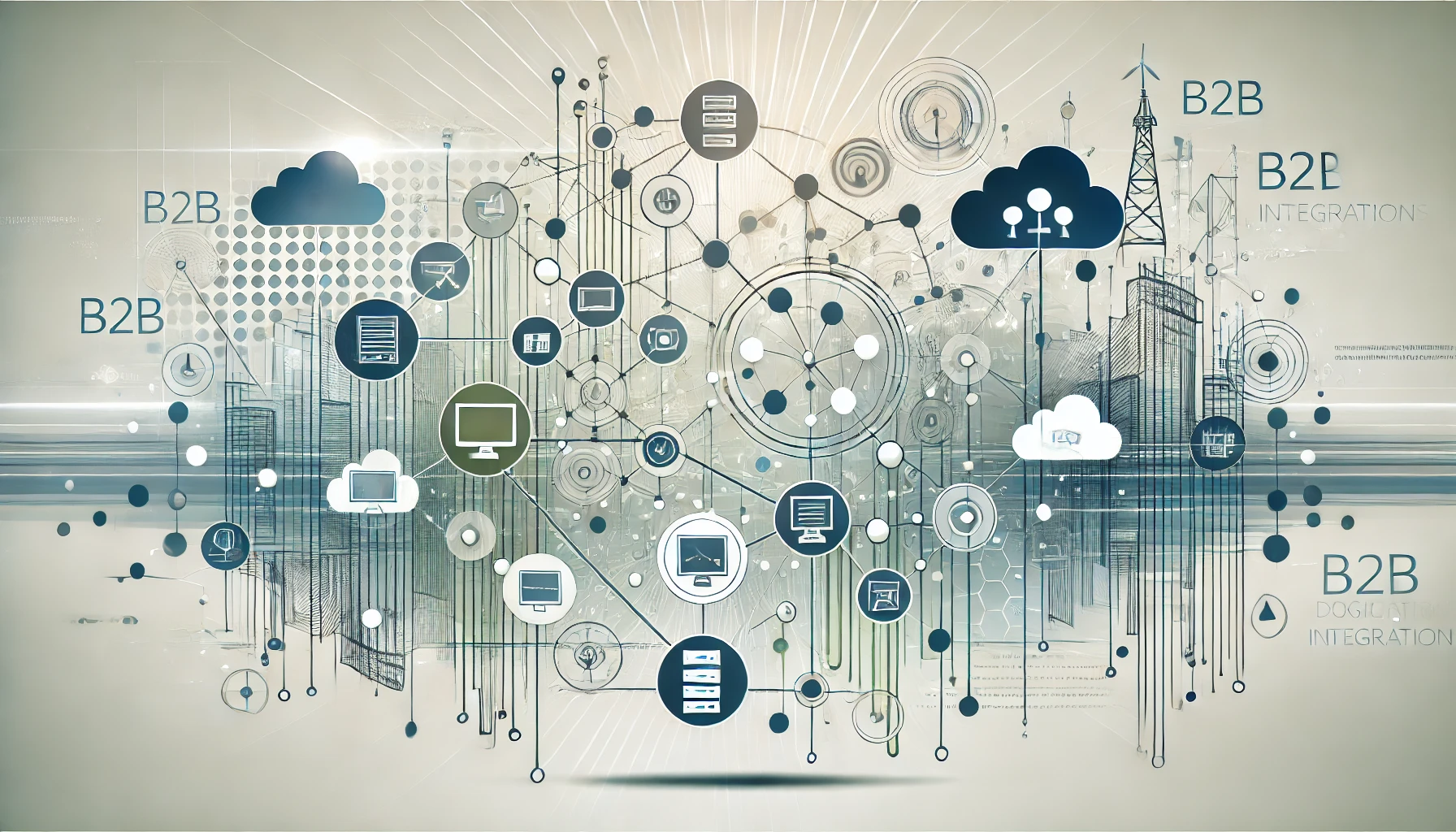As you ponder the future of B2B/EDI integration services, consider the evolving landscape shaped by cutting-edge technologies. The convergence of AI, IoT, and blockchain holds promises of heightened efficiency and security. How will these advancements redefine collaboration and data exchange in the realm of business integration? Stay tuned to explore the transformative potential and strategic implications that lie ahead in the realm of B2B/EDI integration services.
Emerging Technologies in B2B/EDI Integration
As businesses navigate the ever-evolving landscape of B2B/EDI integration, the importance of staying abreast of emerging technologies cannot be overstated. Two key technologies shaping the future of B2B/EDI integration are blockchain integration and IoT connectivity.
Blockchain integration offers secure, transparent, and tamper-proof transactions, revolutionizing how businesses exchange information. By incorporating blockchain into B2B/EDI processes, companies can enhance data security, streamline transactions, and increase trust between partners. The decentralized nature of blockchain ensures that data remains safe and unaltered throughout the supply chain.
On the other hand, IoT connectivity enables seamless communication between devices, allowing for real-time data exchange and automation. Integrating IoT devices into B2B/EDI workflows facilitates efficient inventory management, predictive maintenance, and enhanced decision-making capabilities. By leveraging IoT connectivity, businesses can optimize their operations, reduce costs, and improve overall efficiency in the B2B environment.
Embracing these emerging technologies in B2B/EDI integration will be crucial for companies looking to stay competitive and drive innovation in the future.
Impact of AI and Machine Learning
As you explore the future of B2B/EDI integration services, it’s crucial to consider the profound impact of AI and Machine Learning. AI’s role in integration can streamline processes, enhance decision-making, and automate repetitive tasks. Machine learning brings added benefits such as predictive analytics, anomaly detection, and continuous improvement in operational efficiency.
AI in Integration
The utilization of AI and machine learning in integration services is revolutionizing the B2B landscape, offering unparalleled efficiency and accuracy. Data analytics play a crucial role in AI integration by enabling businesses to extract valuable insights from vast amounts of data. By leveraging advanced algorithms, companies can enhance decision-making processes and optimize operations based on real-time data analysis.
Predictive modeling, another key aspect of AI integration, empowers businesses to forecast trends, anticipate customer needs, and preempt potential issues. This capability allows organizations to proactively address challenges before they escalate, leading to improved customer satisfaction and operational efficiency. AI-driven predictive modeling also enables companies to adapt quickly to market changes and make informed strategic decisions.
Incorporating AI in integration services not only streamlines processes but also enhances overall business performance. By harnessing the power of data analytics and predictive modeling, companies can stay ahead of the curve in the competitive B2B landscape, driving growth and innovation.
Machine Learning Benefits
Among the transformative impacts of AI and machine learning in the realm of B2B integration services is the plethora of benefits derived from machine learning algorithms. Predictive analytics, a key component of machine learning, allows businesses to forecast future trends and behaviors based on historical data. This capability empowers organizations to make data-driven decisions, optimize processes, and anticipate customer needs more effectively.
Deep learning, a subset of machine learning, enables systems to automatically learn and improve from experience without being explicitly programmed. By utilizing deep learning algorithms, B2B integration services can enhance automation, streamline workflows, and boost efficiency.
Data mining plays a crucial role in uncovering valuable insights from vast datasets, aiding in identifying patterns and correlations that might otherwise go unnoticed. This process enhances decision-making and strategic planning within B2B integration services.
Pattern recognition, another core aspect of machine learning, assists in identifying regularities in data, facilitating the detection of anomalies and potential issues. By leveraging pattern recognition capabilities, businesses can enhance security measures and proactively address risks within their integration processes.
Enhanced Security Measures
With cyber threats evolving at an alarming rate, businesses must prioritize implementing robust security measures to safeguard their B2B/EDI integration services. To enhance security, employing data encryption is crucial. Data encryption ensures that sensitive information shared between trading partners is scrambled, making it unreadable to unauthorized parties. Additionally, implementing strict access control mechanisms is essential. By restricting access to only authorized personnel and partners, businesses can mitigate the risk of data breaches and unauthorized data manipulation.
Furthermore, adopting multi-factor authentication adds an extra layer of security by requiring additional verification steps beyond passwords. Regular security audits and penetration testing can help identify vulnerabilities and ensure that security measures are up to date. Continuous monitoring of network traffic and system logs can enable early detection of suspicious activities, allowing for timely response and mitigation of potential security threats. By incorporating these enhanced security measures, businesses can fortify their B2B/EDI integration services against cyber threats and safeguard their valuable data.
Integration With Iot and Blockchain
Amidst the rapidly advancing technological landscape, integrating B2B/EDI services with IoT and blockchain presents a transformative opportunity for businesses seeking to enhance operational efficiency and streamline data exchange processes. By incorporating IoT compatibility, businesses can leverage interconnected devices to gather real-time data, enabling proactive decision-making and optimized supply chain management. This integration allows for seamless communication between devices and systems, paving the way for automated workflows and improved visibility across the network.
Furthermore, blockchain integration offers a secure and transparent way to record transactions and track goods throughout the supply chain. The decentralized nature of blockchain ensures data integrity and authenticity, reducing the risk of fraud and enhancing trust among trading partners. Smart contracts enabled by blockchain technology streamline processes such as invoicing and payments, eliminating manual intervention and minimizing errors.
Personalization and Customer Experience
You can elevate your B2B/EDI integration services by focusing on personalized data exchange, which allows for tailored interactions that cater to the unique needs of each customer. By enhancing user interactions through customization, you can improve customer satisfaction and loyalty. Offering tailored integration solutions ensures that your clients receive a seamless and efficient experience that aligns with their specific requirements.
Customized Data Exchange
When it comes to enhancing the efficiency and value of B2B/EDI integration services, one crucial aspect that stands out is the concept of Customized Data Exchange. This strategy involves tailoring data transformation processes to meet the specific needs of each business partner, ensuring seamless integration and improved operational effectiveness. Real-time monitoring plays a key role in this approach, allowing for immediate visibility into data exchange processes and enabling quick identification and resolution of any issues that may arise.
Enhanced User Interactions
Enhancing user interactions through personalized experiences is a fundamental strategy in elevating the customer experience within B2B/EDI integration services. To achieve this, focusing on user experience and interface design is crucial.
- Customized Dashboards: Tailoring dashboards to display relevant information for each user can significantly improve usability and efficiency. By allowing users to personalize their dashboards based on their specific needs, you enhance their overall experience and productivity.
- Interactive Notifications: Implementing interactive notifications that provide real-time updates and actionable insights can streamline communication and decision-making processes. These notifications can be customized based on user preferences to ensure they receive the most relevant information promptly.
- Personalized Training Modules: Creating personalized training modules tailored to individual users’ needs and skill levels can enhance user onboarding and ongoing support. This approach ensures that users receive the guidance and resources they require to maximize the benefits of the integration services.
Tailored Integration Solutions
Implementing tailored integration solutions is a strategic approach that can significantly enhance personalization and customer experience within B2B/EDI services. By offering industry-specific solutions, businesses can cater to the unique needs of different sectors, providing a more personalized experience. These tailored solutions not only increase customer satisfaction but also drive loyalty and retention. Additionally, companies can benefit from cost-effective options that are designed to streamline processes and optimize efficiency.
Scalable architecture plays a crucial role in ensuring that integration solutions can grow alongside the business. This flexibility allows companies to adapt to changing requirements and accommodate future growth seamlessly. Furthermore, seamless connectivity is essential for a smooth integration process, enabling real-time data exchange and enhancing collaboration between partners.
Automation and Process Optimization
To streamline operations and drive efficiency in B2B/EDI integration services, automation and process optimization play a pivotal role. Implementing automation tools and optimizing processes can lead to significant benefits in efficiency enhancement and cost reduction. Here’s how these strategies can transform your integration services:
- Automated Data Entry: By automating the entry of data into systems, you can reduce manual errors and accelerate processing times.
- Workflow Automation: Implementing workflow automation ensures that tasks are completed in a timely manner, reducing bottlenecks and improving overall efficiency.
- Process Standardization: Standardizing processes across your integration services ensures consistency and allows for easier scalability as your business grows.
Frequently Asked Questions
How Can B2b/Edi Integration Services Adapt to Future Regulatory Changes?
To adapt to future regulatory changes, you must stay updated on technology advancements. Address compliance requirements promptly and align with industry standards. Enhance data security measures to safeguard sensitive information. Proactive monitoring and agile adjustments are key.
What Are the Potential Challenges of Scaling B2b/Edi Integration Services Globally?
Scaling b2b/edi integration services globally presents challenges. Cross-border complexities like varying regulations and cultural differences can hinder seamless expansion. Language barriers may impede effective communication, necessitating multilingual support for successful international growth.
How Will B2b/Edi Integration Services Address Data Privacy Concerns in the Future?
Data privacy concerns in b2b/edi integration services will be addressed through robust data encryption protocols and stringent compliance requirements. Ensuring secure transmission and storage of sensitive information will be pivotal for future success in this realm.
What Role Will B2b/Edi Integration Services Play in Sustainability and Green Initiatives?
When considering sustainability impact, B2B/EDI integration services are pivotal in fostering green technology integration. They streamline processes, reduce paper usage, and enhance efficiency, aligning with eco-friendly initiatives. Embracing these services can lead to substantial environmental benefits and cost savings.
How Can Businesses Ensure Interoperability Between Different B2b/Edi Integration Platforms?
To ensure interoperability between different B2B/EDI integration platforms, focus on meticulous data mapping and ensure protocol compatibility. Combine meticulous data mapping with versatile protocol compatibility to seamlessly link varied platforms for enhanced efficiency and connectivity.



